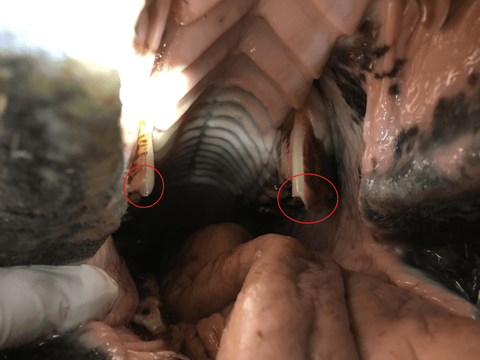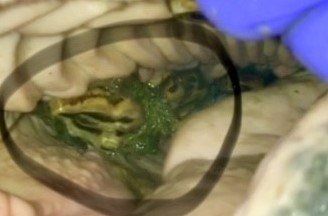ROUTINE AND ADVANCED DENTISTRY
Dentistry is a particular interest of our practice and we have invested in top-quality equipment to make the experience as pleasant as possible for both owner and their equine. Our quiet battery-operated mechanical rasp allows easy reduction of large overgrowths. Manual rasps are also available for those cases where they are suitable.
We are happy to work both with and without sedation (patient and procedure permitting) and always carry out a full external head exam, check lateral excursion and make use of a mirror and high-powered surgical head-torch to visualise inside the mouth. Only by doing this is it possible to pick up various pathologies that may be present.
Our High Definition oroscope allows detailed images and video of tooth surfaces to be obtained, ensuring that all pathology is spotted.
We recommend all horses have at least a yearly dental and many will benefit from 6-monthly dentals, especially younger and geriatric individuals.
Services offered include routine dental maintenance, reduction of large overgrowths, oral extractions, diastema widening and bridging and management of periodontal disease.
We undertake regular dentistry CPD and recent courses have included Practical Dental and Sinus Surgery at Rossdales and attendance at the Equine Veterinary Dental Association Congress in Newmarket.

Routine and Remedial Dentistry
All equines should receive at least annual dentals to check for and manage sharp enamel points, reduce and prevent overgrowth formation and to check for any other problems. Comprehensive nutritional advice can be provided on request. Full dental charts are provided.
We also have a High Definition oroscope, allowing close-up visualization of pathology where necessary.

Diastemata and Periodontal Disease
Some horses have gaps (diastemata) between teeth where food packs, creating an unhealthy oral environment, low pH and leading to formation of deep pockets. These are especially common in geriatric horses. Treatment by picking, flushing and, if appropriate, by widening and packing these pockets can positively influence oral health and even improve ridden behaviour.

Extractions
If your horse is unlucky enough to need an extraction then this can usually be performed on your yard using regional nerve blocks, topical local anaesthetic and appropriate analgesia. Full aftercare is provided, including post-extraction checks and advice. Wolf tooth extractions and deciduous cap removal can be undertaken as part of a routine dental where this is required.

Incisors and EOTRH
It is very important to check the incisor teeth on every dental prior to placement of the speculum. Often, pathology in these teeth is missed with detrimental results. It is especially important given that incisor and canine teeth at the front of the mouth can suffer from a condition known as Equine Odontoclastic Tooth Resorption and Hypercementosis (EOTRH). This is a painful condition of unknown cause, often requiring extraction of affected teeth. Such teeth are commonly fractured and may require surgical removal.
